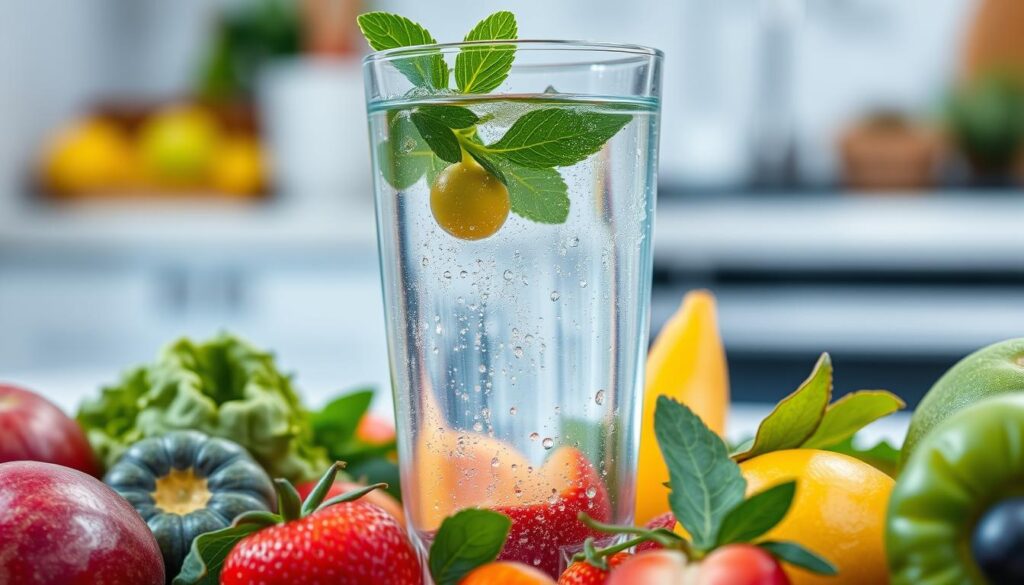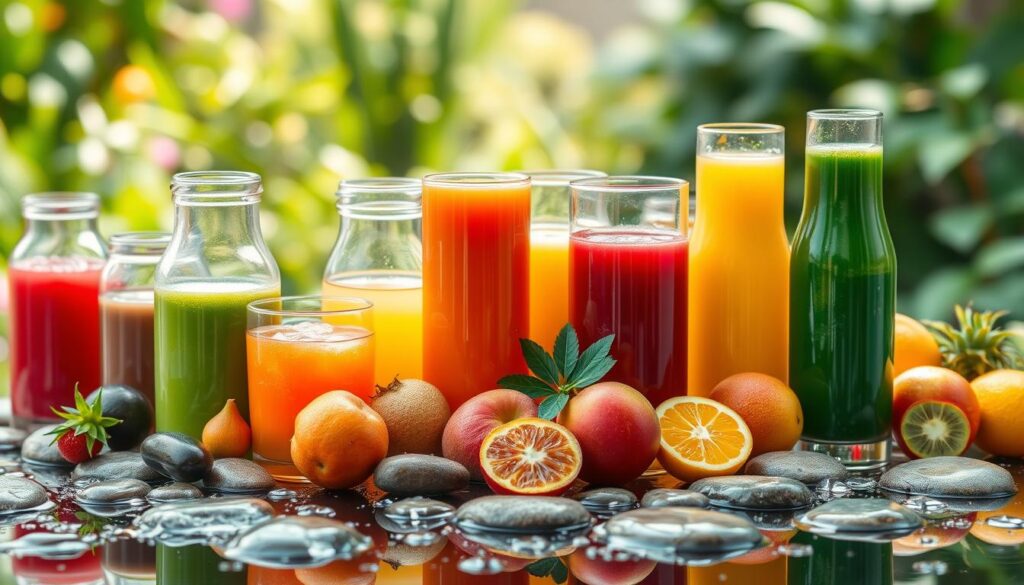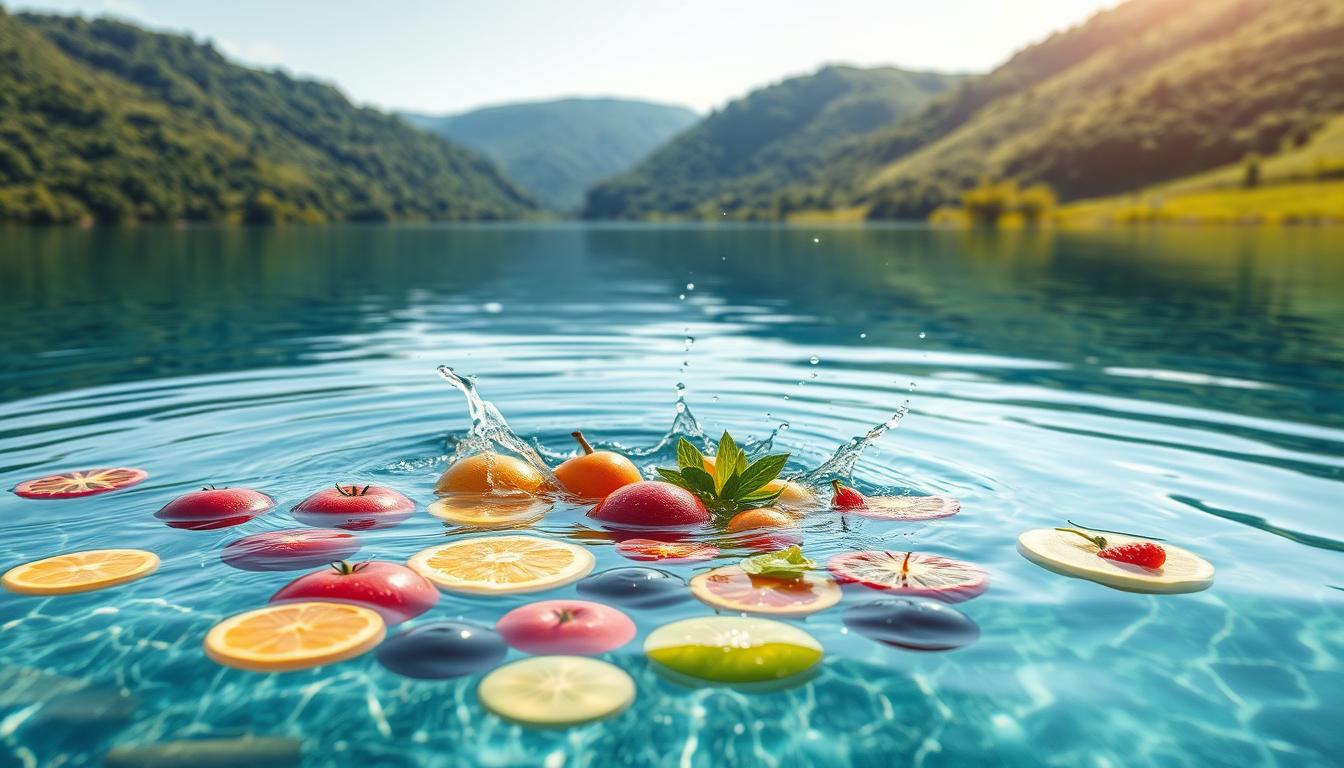Starting a liquid diet can seem scary, but knowing water’s role in it changed everything for me. Since our bodies are mostly water, focusing on water intake for liquid diets was key. I’ve found that staying hydrated is more than just drinking water; it’s about how we do it.
Research showed me that liquid diets need more than just water to be effective. It’s surprising how many people don’t drink enough water. So, I vowed to drink more than the recommended amount to stay hydrated.
Key Takeaways
- More than half of our body’s composition is water, highlighting the critical nature of hydration.
- A significant portion of the population does not meet the minimum daily liquid requirement.
- An individual loses an average of 70-100 fl. oz. of water daily, necessitating replenishment.
- Proper hydration involves consuming at least 85 fl. oz. of water daily, with adjustments based on personal and environmental factors.
- To maintain adequate hydration, it’s vital to spread fluid intake evenly throughout the day.
- Integrating electrolytes like sodium and potassium enhances water absorption and balances fluid retention.
- High-quality electrolyte supplements can support ongoing hydration and overall health.
Exploring the Foundations of Liquid Dieting
Starting a liquid diet is a unique way to manage your diet. It offers health benefits but also has challenges. Originally for medical use, it’s now seen as a way to lose weight. We’ll look at what these diets are, what they offer, and their limits.
Defining a Liquid Diet: Beyond the Basics
A liquid diet means eating only liquids or foods that are liquid at room temperature. It’s mainly for people with health issues to make digestion easier. This diet isn’t just about drinking water; it also includes nutrients in a liquid form.
Types of Liquid Diets: Full, Clear, and Modified
There are different types of liquid diets. The full liquid diet includes juices, milk, soups, and smoothies. It’s designed to be gentle on the stomach and provide nutrients.
A clear liquid diet is much stricter. It only includes clear fluids like broths and juices without pulp. This diet is good for keeping the digestive system empty, which is needed for some medical tests.
The modified liquid diet is a middle ground. It allows some solid foods like yogurt and blended soups. It offers more variety while still being easy to digest.
Benefits and Challenges of Liquid Diets
- Liquid diet benefits include easier weight management and detoxification.
- They are also easier to digest.
- But, they can lead to nutritional deficiencies and muscle loss from low protein.
- They might also cause hunger and make it hard to stick to them long-term.
When using liquid diets for weight loss, it’s important to do it carefully. Always get professional advice to avoid health problems and ensure you get enough nutrients.
In summary, knowing the liquid diet benefits and types can help guide you. Whether for health reasons or weight loss, it’s key to make the diet fit your needs and lifestyle. This way, it can be a healthy part of your life.
How Water Plays a Vital Role in Effective Liquid Diet Programs
In the world of liquid diets, the benefits of water on a liquid diet are huge. Water does more than just quench thirst. It helps your body absorb nutrients and work well. Since about 60% of our bodies are water, it plays a big role in our health, including metabolism and skin.
Drinking enough water is key when you’re on a liquid diet. Drinking water before meals can make you eat less. This shows how important hydration and weight management are together.
Let’s look at some interesting facts about water and weight:
| Study & Year | Outcome | Impact on Liquid Diet |
|---|---|---|
| 2016 – Water intake before meals | 22% reduction in calorie intake | Enhances satiety, aiding in calorie control |
| 2015 – Replacing diet beverages with water | Greater weight reduction | Reduces calorie intake from sugary drinks |
| 2003 – Effect of chilled water on metabolism | 30% increase in metabolic rate | Boosts metabolism, supporting weight loss |
Drinking enough water also keeps your body working right. It helps your muscles and kidneys. Without enough water, you might feel tired, have trouble thinking, and your skin might not look good.

I’ve been on a liquid diet before, and I know how important water is. Drinking the right amount of water and keeping your electrolytes balanced can really help your diet. Make sure every drink helps you reach your weight goals and keeps your body healthy.
To stay on top of your hydration, track how much water you drink each day. Look for clear, odorless urine to know you’re drinking enough. Water is more than just something to drink; it’s a key to good health and weight management.
The Health Benefits of Hydration in Weight Loss
Knowing the importance of hydration in weight loss is key for those on a liquid diet. Water makes up about 60% of our bodies. It’s vital for our health and boosts the liquid diet benefits by helping with metabolism and weight control.
Weight Management and the Power of Hydration
Drinking enough water is crucial for weight management. Studies show that more water intake can lead to weight loss. It boosts metabolism and cuts down calorie intake.
Even a little dehydration can harm our brain and body. This is important for staying active while on a liquid diet.
Scientific Insights: Hydration’s Role in Metabolism
Research shows that water helps break down fats and nutrients. This improves muscle function, focus, and endurance. It’s great for weight loss programs, giving the body the energy it needs.
Drinking water also helps avoid constipation and kidney stones. These are common issues when changing diets.
| Effect of Water Intake | Outcome |
|---|---|
| Increase in metabolism | Facilitates faster calorie burn |
| Enhances lipolysis | Increases fat breakdown |
| Prevents constipation | Improves digestive health |
| Reduces kidney stone risk | Improves renal function |
| Decreases food intake | Supports lower calorie consumption |
Drinking enough water is essential for a liquid diet’s success and overall health. By focusing on importance of hydration in weight loss, your body can better process nutrients. This leads to better weight management and overall health.
Nourishing Your Body: The Best Liquids for Your Diet
Starting a liquid diet means picking the right liquids for good nutrition. Knowing the best liquids for dieting is important for health and enjoying the liquid diet benefits. Here’s a guide to choose liquids that are both tasty and nutritious.
I choose liquids that hydrate and give me important vitamins and minerals. Homemade smoothies are great because I can mix fruits like strawberries and veggies like cucumbers. These smoothies are not just drinks but meals that keep me full and energized.
Soups are also a key part of my diet. Broths from lean meats or veggies are full of protein and fiber when strained. They help me feel full and prevent hunger, which is common on less planned diets. Just make sure they’re thin enough to count as a liquid diet.
It’s important to get enough protein. That’s why I drink milk, almond milk, or soy drinks. They give me protein and keep my diet balanced. But, a liquid diet might not give enough calories for everyone’s energy needs. So, I eat small amounts often to keep my metabolism up and hunger away.
| Liquid Type | Key Nutrients | Caloric Content | Typical Usage |
|---|---|---|---|
| Fruit & Vegetable Juices | Vitamins, Minerals, Some Fiber | Low to Medium | Daytime Refreshment |
| Bone or Vegetable Broths | Proteins, Essential Minerals | Low | Meal Base or Between meals |
| dairy and Plant-based Milks | Protein, Calcium | Medium | Main Drink Meals and Smoothies |
| Meal Replacement Shakes | Balanced Mix of Macro & Micronutrients | High | Meal Replacement |
These tips are a good start for anyone looking at the best liquids for dieting. Finding the right mix of hydration and nutrition is key. The options I mentioned help you enjoy the liquid diet benefits, supporting weight loss and keeping your body nourished.
Implementing Successful Strategies for Staying Hydrated
Starting a liquid diet means you need to drink enough water. It’s not just about feeling thirsty. It’s about keeping your body working well while you’re on your diet. Staying hydrated during a liquid diet is important. It starts with setting good hydration goals and using helpful tips to reach them.
Setting Realistic Hydration Goals
If you’re active or live in a hot place, you might need more water. The National Academy of Medicine says you should drink 90-125 ounces (2,700–3,700 ml) a day. Setting goals that are SMART—Specific, Measurable, Achievable, Relevant, Time-bound—can help. This might mean drinking 32 ounces (960 ml) of water each day in set times.
Hydration Hacks: Tips for Drinking Enough Water
Adding water-rich foods to your diet can help you meet your hydration goals. Foods like lettuce, celery, and watermelon are full of water. They make drinking water more fun and varied.
Carrying a reusable water bottle is another good idea. It reminds you to drink water and is easy to use. If plain water tastes bad to you, try adding lemon, lime, or cranberry. It can make drinking water more enjoyable.
Remembering to drink water every hour is also helpful. This is especially true in places like offices where time flies by.
| Hydration Source | Water Content % | Notes |
|---|---|---|
| Lettuce | 96% | High in fiber, very hydrating |
| Celery | 95% | Low calorie, good for snacks |
| Zucchini | 95% | Flexible in recipes |
| Watermelon | 91% | Rich in vitamins A and C |
| Cantaloupe | 90% | Contains potassium |
Using these simple tips can really help you drink more water on your diet. Remember, staying hydrated is key to good health and reaching your diet goals.
A Closer Look at Hydration and Liquid Diet Outcomes
Hydration and weight management are closely linked, especially with liquid diets. The benefits of water in a liquid diet are key. They show water’s role goes beyond just adding to our diet.
The Direct Correlation Between Hydration Levels and Diet Effectiveness
Keeping your body hydrated is key to a liquid diet’s success. Drinking enough water helps you feel full and eat less. This is important for losing weight.
Water also helps your body burn fat better. It cleanses your body, which is vital when you’re eating mostly liquids.
Choosing the right liquids is crucial. Options like clear broths and ice pops are good. They help you stay hydrated without upsetting your stomach. This balance is key for any diet, especially for losing weight.
Personal Testimonies: Success Stories of Enhanced Hydration
Many people have lost weight thanks to a liquid diet and enough water. They say drinking water helped them lose weight fast. It also made them feel healthier and more energetic.
Hydration is also important for keeping weight off long-term. People who stay hydrated after dieting find it easier to keep their weight down. They also find it easier to start eating solid foods again.

Hydration is crucial for a successful liquid diet. It’s not just about drinking water. It’s about drinking it in a way that supports your diet. This helps with both health and weight loss. So, knowing how to hydrate properly is important for anyone trying to improve their diet.
The Potential Pitfalls of Inadequate Hydration
In the world of liquid diets, knowing the importance of hydration in weight loss is key. These diets can help you lose weight fast, but they can also cause dehydration. It’s vital to watch for dehydration signs and drink enough water for liquid diets to stay healthy.
Recognizing the Signs of Dehydration
On a liquid diet, dehydration can show up in different ways. Look out for headaches, feeling very tired, and dry skin. These signs can mess up your diet if you don’t take care of them. Listen to your body and drink enough water to avoid these problems.
Water’s Role in Preventing Diet-Induced Health Risks
Water does more than just keep you hydrated on a liquid diet. It helps your metabolism and stops muscle loss, which is common in strict diets. It helps control your metabolism and keeps you full, which is key for losing weight for good. Also, it helps avoid the up and down weight changes that can happen with dieting.
Not drinking enough water can cause serious problems like kidney stones. It can also make conditions like high blood pressure worse. So, drinking enough water for liquid diets is not just about losing weight. It’s also about keeping your body healthy.
Many people don’t drink enough water, especially in places like hospitals. Up to half of the people there might be dehydrated. This shows how important it is to check if people are drinking enough water, especially if they’re on special diets. Drinking water helps your body fight off health problems caused by not getting enough nutrients and water.
Drinking enough water is a basic part of staying healthy. It helps your body work right and keeps you from getting sick. When you’re on a liquid diet, it’s even more important to drink plenty of water. Remember, losing weight is not just about what you eat. It’s also about what you drink.
Conclusion
Starting a liquid diet can change how we think about losing weight and getting healthier. I’ve learned how important water is in these diets. It’s not just good, it’s essential.
We’ve seen many ways to stay hydrated on a liquid diet. Success comes from getting the right nutrients and drinking enough water.
Water in a liquid diet does more than just quench thirst. It helps our bodies work better. It’s key for our health.
Water’s role goes beyond drinking it. It’s important for growing food and farming. Places like Agricolleges International teach us about this.
Getting help from experts is crucial for a good liquid diet. It should include enough water. This can help manage weight and improve health.
It’s not just about quick wins. It’s about lasting change and a healthy life. I hope you can use water to get healthier and feel better.




